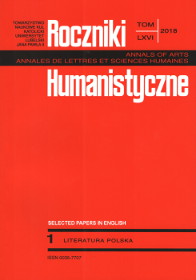In the Circle of the Tragic: The Book of Job. A Fragment of a Greater Fragment
Abstract
The Polish version of the article was published in “Roczniki Humanistyczne,” vol. 57 (2009), issue 1.
Job’s drama that is equally a drama of existence and a drama of faith reveals the dimension that is in fact rarely seen in Greek tragedy, namely the transcendental tragic dimension. The identity tensions between the image of God whom Job accuses of cruelty and the image of the “defender in high” (go’el) mentioned by Job, one who would take the side of his suffering, at the same time testifying to the fact that Job was not guilty, opens the possibility of transformations blending the different images into a figure of transcendental tragic quality—based on a figure similar to the Greek figure of a tragic transfer—in which God, as the ultimate source of everything, including unjust misery, not only takes the side of human suffering but also experiences the suffering himself, revealing the analogy and then the interpretative identity of levels of human and divine experience of the tragic. The Book of Job is only the necessary starting point for the possible transformation of the image of God introducing a split of the image of God (the motif of go’el) in the book protagonist's complaint and deconstructing the category of “just retaliation.” The conditions that make transformation possible can be found in The Book of Isaiah, especially in the image of “The Lord’s Servant” and in Messianic interpretations of this picture closely connected with the phrase: “It was the Lord’s will to crush him with pain” (Is 53:10).
References
Abramson, Henry. Torah from the Years of Wrath. The Historical Context of the “Aish Kodesh.” New York: CreateSpace Independent Publishing Platform, 2017.
Adamczewski, Zygmunt. Tragiczny protest [A tragic protest]. Translated by Zygmunt Kubiak. Warszawa: Państwowy Instytut Wydawczniczy, 1969.
Księga Hioba [The Book of Job]. Translated by Izaak Cylkow. Kraków: Austeria, 2008.
Girard, René. The Scapegoat. Translated by Yvonne Freccero. Baltimore: Johns Hopkins UP, 1989.
Girard, René. “The Ancient Trail Trodden by the Wicked.” In Job. The Victim of His People. Translated by Yvonne Freccero, 14–20. Stanford: Stanford University Press, 1987
Herbert, Zbigniew. Rozmyślania Pana Cogito o odkupieniu [Mr Cogito’s Meditations on Redemption]. In Pan Cogito [Mr Cogito]. Wrocław: Wydawnictwo Dolnośląskie, 1998.
Hiob biblijny. Hiob obecny w kulturze [The biblical Job. Job present in culture], edited by Piotr Mitzner, Anna Szczepan-Wojnarska. Warszawa: Wydawnictwo UKSW, 2010.
Jaspers, Karl. Filozofia egzystencji [Philosophy of Existence]. Translated by Dorota Lachowska, Anna Wołkowicz. Warszawa: Państwowy Instytut Wydawniczy, 1990.
Kacenelson, Icchak. Pieśń o zamordowanym żydowskim narodzie, edited and notes by Jerzy Ficowski. Warszawa: Czytelnik, 1986; The Song of the Murdered Jewish People, transl. Noah H. Rosenbloom: http://motlc.wiesenthal.com/site/pp.asp?c=ivKVLcMVIsG&b=476157 [access: 2019–01–20].
Kierkegaard, Søren. Bojaźń i drżenie. Choroba na śmierć [Fear and Trembling. Sickness unto Death]. Translated by Jarosław Iwaszkiewicz. Warszawa: Homini, 1972.
Krakowiak, Józef. Tragizm ludzkiej egzystencji jako problem filozoficzny [The tragedy of human life as a philosophical problem]. Warszawa: Wydawnictwo Naukowe Scholar, 2005.
Kuczera-Chachulska, Bernadetta. “Niejednoznaczność Hioba. Między teologią a literackością” [The ambiguous Job. Between theology and literature]. In Hiob biblijny. Hiob obecny w kulturze, edited by Piotr Mitzner, Anna Szczepan-Wojnarska, 17–26. Warszawa: Wydawnictwo UKSW, 2010.
Księga Hioba [The Book of Job]. Translated by Czesław Miłosz. Lublin: Redakcja Wydawnictw KUL, 1981.
Księga Hioba [The Book of Job]. Translated by Roland. E. Murphy, translated on Polish Henryk Bednarek. In Międzynarodowy komentarz do Pisma Świętego [An international commentary to the Holy Bible], edited by William Reuben Farmer, 656-675. Warszawa: Verbinum, 2001.
Nietzsche, Friedrich. The Birth of Tragedy; or: Hellenism and Pessimism. Translated by Douglas Smith. Oxford: Nabu Press, 2000.
Księga Izajasza [The Book of Isaiah]. Translated by Anne-Marie Pelletier, translated on Polish by Bernard Wodecki. In Międzynarodowy komentarz do Pisma Świętego [An international commentary to the Holy Bible], edited by William Reuben Farmer, 843–881. Warszawa: Verbinum, 2001.
The New American Bible. Nashville–Camden–New York: Catholic Bible Publishers, 1983.
Pismo Święte, after the 4th edition of Biblia Tysiąclecia, HTML, edited by the Team of the Pontifical Faculty of Theology in Poznań.
Polen, Nohemi. The Holy Fire: The Teachings of Rabbi Kalonymus Kalman Shapira, the Rebbe of the Warsaw Ghetto, New Jersey: Jason Aronson, 1994, 2nd ed. 1999.
Ricoeur, Paul. The Symbolism of Evil. New York: Harper & Row, 1969.
Safranski, Rüdiger. Zło. Dramat wolności [Evil. The Drama of Freedom]. Translated by Ireneusz Kania. Warszawa: Czytelnik, 1999.
Scheler, Max. “On the Tragic.” Translated by Bernard Stambler, Cross Currents 4 (1954): 178–191.
Shapira, Kalman. Sacred Fire: Torah from the Years of Fury, 1939-1942. Translated by J. Hershy Worch. New Jersey–Jerusalem: J. Arnson Inc., 2000.
[Shapira, Kalman]. Sefer Aish Kodesh., Piaseczno–Jerusalem: Vaad Hasidey, 1960.
Szapira, Rabbi Kalonymos Kalmisz. “Święty ogień. Tora z lat 1939–1942, lat szału” [Sacred fire. The Torah from the years 1939–1942]. Selected and edited by Witold Mędykowski, transl. Ireneusz Kania. Znak 4, No. 611 (2006): 58–110.
Śpiewak, Paweł. “Kaznodzieje getta warszawskiego” [Preachers of the Warsaw Ghetto]. Znak 3, No. 490 (1996): 120–130.
“Taniec opowieści, czyli chasydzi Piaseczna” [A dance of stories, or the tsaddiks from Piaseczno], [online:] www.studnia.org/piaseczno.ramka.htm, [access: 2018–09–13]. Information about the rabbi compiled by Włodzimierz Bagieński and Piotr Rytka – Cadyk Piaseczna [A tsaddik from Piaseczno] bookmark.
Tyszczyk, Andrzej. Od strony wartości. Studia z pogranicza teorii literatury i estetyki [From the position of values. Studies on the crossroads of literary theory and esthetics]. Lublin: Wydawnictwo KUL, 2007.
Zieliński, Tadeusz. Sofokles i jego twórczość tragiczna [Sophocles and his tragedies]. Kraków: Krakowska Spółka Wydawnicza, 1928.
Copyright (c) 2018 Roczniki Humanistyczne

This work is licensed under a Creative Commons Attribution-NonCommercial-NoDerivatives 4.0 International License.





